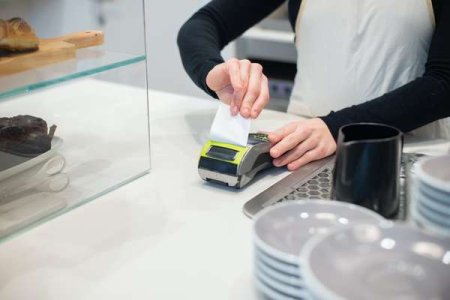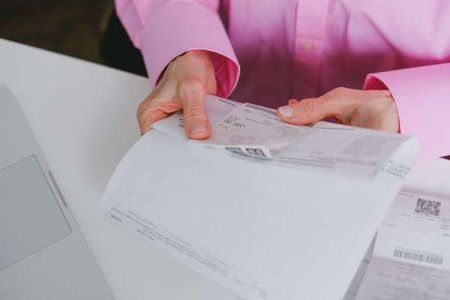What's hiding on your receipt? 'Alarming' detail sparks calls for big changes in Australia
In an era where environmental consciousness is at the forefront of many minds, a new study has revealed a surprising and concerning detail about a common item we often overlook—paper receipts.
These seemingly innocuous slips of paper carry a larger environmental impact than previously thought.
The research, conducted by the University of Technology Sydney (UTS) and funded by a CSIRO grant, has found that Australia prints an astonishing 10.6 billion paper receipts yearly.
Moreover, these receipts are typically coated with toxic chemicals, rendering them non-recyclable and contributing significantly to environmental damage.
The report, aptly titled The Life Journey of an Average Receipt, has shed light on the environmental impact of this common item.
The production of paper receipts in Australia is equivalent to producing 96,227 metric tonnes of carbon, which is comparable to having 20,918 cars on our roads.
The energy generated from this process could power 18,500 homes.
The study was commissioned by Australian start-up Slyp, a company dedicated to reducing the number of paper receipts that end up in landfills.
Slyp aims to replace these with digital versions that can be delivered through banking or business apps on smart devices.
Paul Weingarth, Slyp's CEO, was surprised by the study's findings.
'It was certainly more alarming than we anticipated and demonstrates the reason for the change, and change takes a village or an army, as they say,' he stated.
The sheer volume of paper receipts produced in Australia is staggering. With the average length of a receipt being 27.85 cm, the total length of receipts produced each year would extend 2.95 million kilometres.
To put this into perspective, this is enough to stretch from the Earth to the Moon, a distance of 384,400km, a whopping 7.6 times.
The study also delved into the supply chain impact of paper receipts, revealing that their production uses up 150,462 trees, 1.56 million litres of water, 96,227 metric carbons of energy, and 104.7 million kilowatts of energy annually.
In stark contrast, digital receipts use zero trees, no water, 3,037 metric carbons of energy and 7.1 million kilowatts of energy.
But the environmental impact is not the only concern. Most receipts are printed on thermal paper, coated with a chemical called Bisphenol A (BPA). This makes them non-recyclable and 1,000 times more toxic than BPA exposure on a plastic bottle.
‘Thermal paper is a special kind of fine paper that is coated with a chemical that changes colour when exposed to heat, instead of using ink for printing,’ the report explained.
The health implications of thermal paper receipts are also a cause for concern. Research has suggested links between BPA and increased blood pressure, fertility issues, type 2 diabetes and cardiovascular disease.
In response to these findings, some retailers, including Coles and Woolworths, have already moved away from using BPA coating.
Other major players, such as Amazon, Google, NAB, Chemist Warehouse and the Australian Retailers Association, are collaborating with Slyp to create digital alternatives.
The shift towards digital receipts is not just about environmental and health concerns. It also aligns with the changing habits of consumers.
Weingarth noted that 40 per cent of Australians have stopped carrying a wallet or bank card and use smart devices to make payments. Therefore, it makes sense for receipts to be received digitally through a banking app or Apple Wallet, allowing customers to 'pay and walk away'.
'By switching to a digital-first mindset, we can create a transaction experience that's not only more convenient for the customer but also more environmentally friendly for our planet,' Mr Weingarth said.
In line with the Black Friday sales, Slyp has spearheaded a consortium of key industry players called FutureProof. This consortium aims to transform the way Australians receive and manage receipts.
'In partnership with the government, we are working together to affect change,' Mr Weingarth said. 'It's exciting.'
Some might think the shift towards digital receipts is a step in the right direction, but it's not without its challenges. For one, not everyone has access to the necessary technology.
Additionally, some people may have privacy concerns about digital receipts, as they often require customers to provide an email address or phone number.

What are your thoughts on digital receipts, members? Are you willing to make the switch? Share your thoughts in the comments below.
These seemingly innocuous slips of paper carry a larger environmental impact than previously thought.
The research, conducted by the University of Technology Sydney (UTS) and funded by a CSIRO grant, has found that Australia prints an astonishing 10.6 billion paper receipts yearly.
Moreover, these receipts are typically coated with toxic chemicals, rendering them non-recyclable and contributing significantly to environmental damage.
The report, aptly titled The Life Journey of an Average Receipt, has shed light on the environmental impact of this common item.
The production of paper receipts in Australia is equivalent to producing 96,227 metric tonnes of carbon, which is comparable to having 20,918 cars on our roads.
The energy generated from this process could power 18,500 homes.
The study was commissioned by Australian start-up Slyp, a company dedicated to reducing the number of paper receipts that end up in landfills.
Slyp aims to replace these with digital versions that can be delivered through banking or business apps on smart devices.
Paul Weingarth, Slyp's CEO, was surprised by the study's findings.
'It was certainly more alarming than we anticipated and demonstrates the reason for the change, and change takes a village or an army, as they say,' he stated.
The sheer volume of paper receipts produced in Australia is staggering. With the average length of a receipt being 27.85 cm, the total length of receipts produced each year would extend 2.95 million kilometres.
To put this into perspective, this is enough to stretch from the Earth to the Moon, a distance of 384,400km, a whopping 7.6 times.
The study also delved into the supply chain impact of paper receipts, revealing that their production uses up 150,462 trees, 1.56 million litres of water, 96,227 metric carbons of energy, and 104.7 million kilowatts of energy annually.
In stark contrast, digital receipts use zero trees, no water, 3,037 metric carbons of energy and 7.1 million kilowatts of energy.
But the environmental impact is not the only concern. Most receipts are printed on thermal paper, coated with a chemical called Bisphenol A (BPA). This makes them non-recyclable and 1,000 times more toxic than BPA exposure on a plastic bottle.
‘Thermal paper is a special kind of fine paper that is coated with a chemical that changes colour when exposed to heat, instead of using ink for printing,’ the report explained.
The health implications of thermal paper receipts are also a cause for concern. Research has suggested links between BPA and increased blood pressure, fertility issues, type 2 diabetes and cardiovascular disease.
In response to these findings, some retailers, including Coles and Woolworths, have already moved away from using BPA coating.
Other major players, such as Amazon, Google, NAB, Chemist Warehouse and the Australian Retailers Association, are collaborating with Slyp to create digital alternatives.
The shift towards digital receipts is not just about environmental and health concerns. It also aligns with the changing habits of consumers.
Weingarth noted that 40 per cent of Australians have stopped carrying a wallet or bank card and use smart devices to make payments. Therefore, it makes sense for receipts to be received digitally through a banking app or Apple Wallet, allowing customers to 'pay and walk away'.
'By switching to a digital-first mindset, we can create a transaction experience that's not only more convenient for the customer but also more environmentally friendly for our planet,' Mr Weingarth said.
In line with the Black Friday sales, Slyp has spearheaded a consortium of key industry players called FutureProof. This consortium aims to transform the way Australians receive and manage receipts.
'In partnership with the government, we are working together to affect change,' Mr Weingarth said. 'It's exciting.'
Some might think the shift towards digital receipts is a step in the right direction, but it's not without its challenges. For one, not everyone has access to the necessary technology.
Additionally, some people may have privacy concerns about digital receipts, as they often require customers to provide an email address or phone number.
Key Takeaways
- Australia prints 10.6 billion paper receipts each year, which are largely non-recyclable due to being coated with toxic chemicals.
- A study by the University of Technology Sydney, funded by a CSIRO grant, highlights the significant environmental impact of paper receipts: equivalent to 96,227 metric tonnes of carbon, using up 150,462 trees, 1.56 million litres of water, and 104.7 million kilowatts of energy annually.
- Thermal paper receipts contain Bisphenol A (BPA), which can potentially lead to health problems, including increased blood pressure, fertility issues, type 2 diabetes and cardiovascular disease.
- Start-up Slyp aims to reduce paper receipt use by promoting digital versions. Collaborations between Slyp and companies like Amazon, Google, NAB, Chemist Warehouse, and the Australian Retailers Association are underway to create digital alternatives.
What are your thoughts on digital receipts, members? Are you willing to make the switch? Share your thoughts in the comments below.









